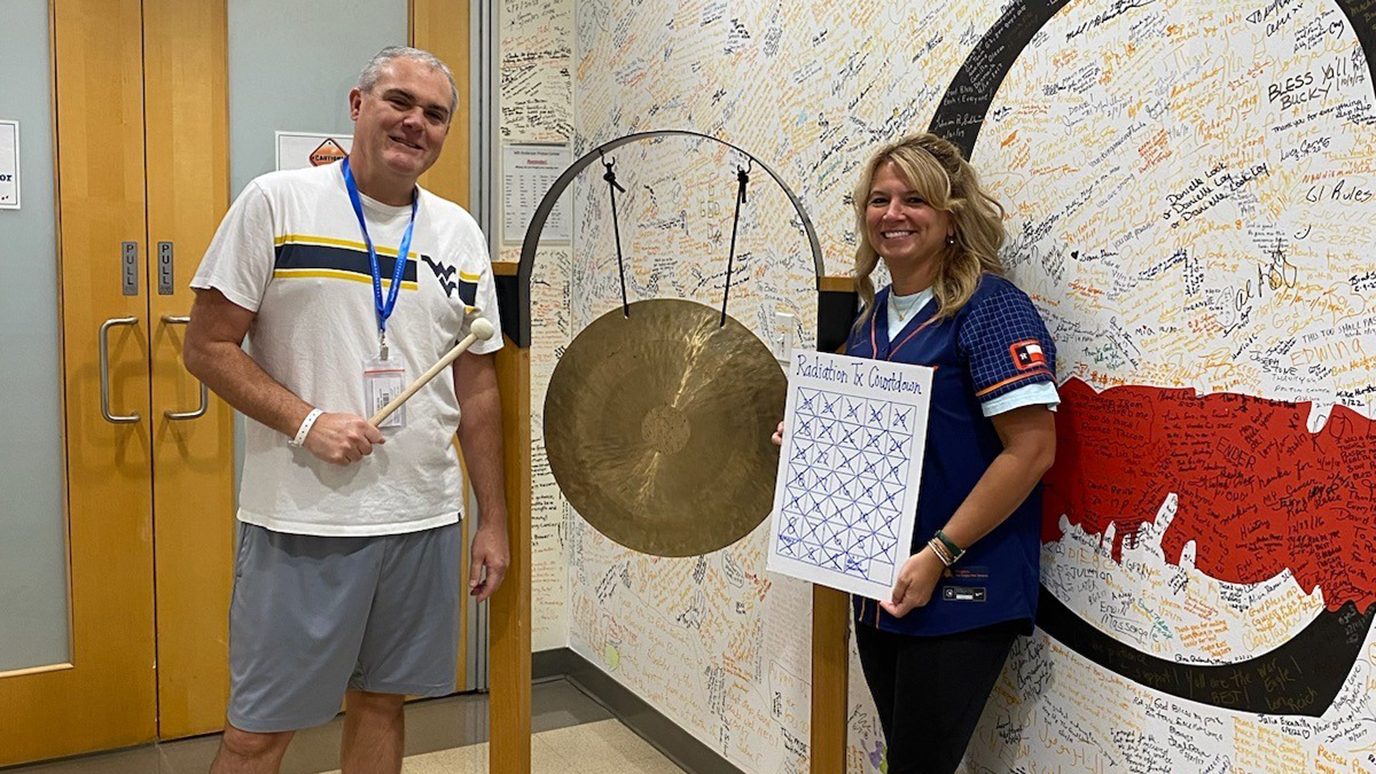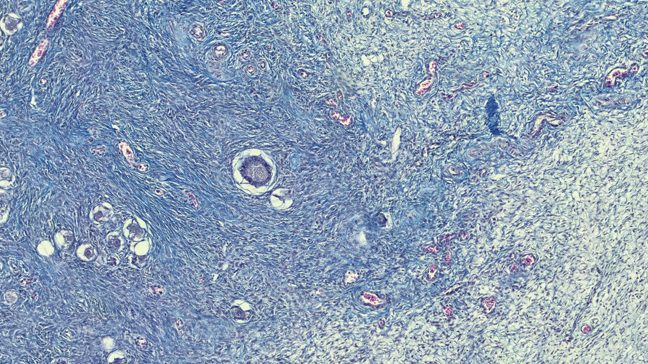request an appointment online.
- Diagnosis & Treatment
- Cancer Types
- Prostate Cancer
Get details about our clinical trials that are currently enrolling patients.
View Clinical TrialsProstate cancer is a type of cancer that starts in the prostate, a walnut-sized gland in the male reproductive system that helps produce semen and nourishes sperm. Prostate cancer forms when cells in the prostate become abnormal and start rapidly multiplying.
Prostate cancer is a type of cancer that starts in the prostate, a walnut-sized gland in the male reproductive system that helps produce semen and nourishes sperm. Prostate cancer forms when cells in the prostate become abnormal and start rapidly multiplying.
The prostate sits just below the bladder and in front of the rectum. It surrounds part of the urethra, the tube that empties urine from the bladder.
The majority of prostate cancers are adenocarcinomas. 'Adenocarcinomas' refer to cancers that begin in the gland cells that help make up the lining of many organs, including the prostate.
Despite only impacting males, prostate cancer is the third most common cancer in the United States, with more than 191,000 new cases diagnosed each year. It is also one of the most treatable cancers, with a five-year survival rate of nearly 98%.
This success is due to a number of factors. The disease is often slow-growing; there are effective, established treatments; and most cases are caught before cancer has spread beyond the prostate, making the disease easier to treat.
Symptoms
Prostate cancer often shows no symptoms in the early stages. In more advanced prostate cancer, symptoms may appear. However, they can vary from person to person. Since the prostate is close to the bladder and surrounds the urethra, which empties the bladder, most symptoms involve urination.
Symptoms of prostate cancer may include:
- Inability to urinate or difficulty in starting to urinate
- Trouble emptying the bladder completely
- Weak or interrupted urine flow
- Painful or burning urination
- Difficulty trying to hold back urination
- Frequent or urgent need to urinate
- Blood in the urine or semen
- Difficulty having or maintaining an erection (erectile dysfunction or ED)
- Continual pain in the bones, including in the lower back, pelvis, hips, or thighs. This is typically only experienced by patients whose prostate cancer has spread to their bones (metastatic prostate cancer).
These symptoms do not always mean you have prostate cancer. Sometimes these symptoms may be related to benign prostatic hyperplasia (BPH), a non-cancerous condition in which the prostate increases in size and may cause urination problems. While BPH needs to be treated, it is not prostate cancer. Other non-cancerous conditions could also cause these symptoms, so it is important to discuss them with your doctor.
Risk factors
Anything that increases your chance of getting prostate cancer is a risk factor. These include:
- Age: This is the most important risk factor. More than 90% of cases are in men who are age 55 or older.
- Family history: Risk is higher when other members of your family (especially father, brother, son) have or had prostate cancer. The risk increases if your family member was diagnosed at a younger age. Learn more about family history and cancer.
- Hereditary cancer syndromes: Certain genetic mutations increase a man’s risk of developing prostate cancer. These include Lynch syndrome and mutations of the BRCA1 and BRCA 2 genes. Learn more about hereditary cancer syndromes.
- Race: African American men or men of African descent have nearly double the risk of prostate cancer as white men. It is found less often in Asian American, Hispanic, and American Indian men.
- Diet: A high-fat diet, particularly a diet high in animal fats, may increase risk. Diets high in fruits and vegetables may decrease risk.
- Nationality: Prostate cancer is more prevalent in North America and northwestern Europe than in other parts of the world.
- Some research suggests that inflammation of the prostate (prostatitis) may play a role in prostate cancer. Sexually transmitted diseases are being investigated as possible risk factors as well.
Prevention
Certain actions may help lower your risk of prostate cancer:
- Eat at least five servings of fruits and vegetables daily and eat less red meat. Decrease fat intake.
- Tell your doctor about the supplements you take. Some of these may decrease the PSA level.
- Exercise regularly
- Maintain your ideal weight
Other ways to prevent prostate cancer are being investigated. These include:
- Lycopenes: These substances found in tomatoes, pink grapefruit and watermelon may help prevent damage to cells.
- Proscar® (finasteride) or Avodart® (dutasteride): These medications can reduce the risk of low-grade prostate cancer. If you are at high risk for prostate cancer, talk to your urologist or another provider who is familiar with studies about these drugs.
Some cases of prostate cancer can be passed down from one generation to the next. Genetic counseling may be right for you. Learn more about the risk to you and your family on our genetic testing page.
Learn more about prostate cancer:
Learn more about clinical trials for prostate cancer.
MD Anderson is #1 in Cancer Care
What to know about metastatic prostate cancer
Metastatic prostate cancer is prostate cancer that has spread outside of the prostate to other parts of the body. This is also known as stage IV disease.
At MD Anderson, I treat patients with advanced prostate cancer, most of whom have metastatic disease. A lot of our research is focused on how we can better treat metastatic prostate cancer to improve patients’ results.
Here, I’ll answer common questions I get about metastatic prostate cancer, including what MD Anderson is doing to advance treatment.
Where is prostate cancer most likely to spread?
Prostate cancer often spreads to the bones and lymph nodes. It most commonly spreads to bones in the pelvis or spine. Sometimes it spreads to the ribs.
Over time, prostate cancer can spread to other bones, such as the base of the skull. This is usually a sign of very advanced cancer.
How is metastatic prostate cancer treated?
We’ve known since the 1940s that prostate cancer is a hormone-driven disease. Early studies showed that surgically removing the testes in men, which decreases the body’s testosterone, led to improvement in prostate cancer – temporarily, at least.
While we don’t commonly perform those surgeries anymore, we continue to direct treatment at testosterone, the male sex hormone. Surgery is usually not an option for metastatic prostate cancer. At MD Anderson, we work together as a team of specialists to treat stage IV prostate cancer. Patients may receive:
Hormone therapy
Antiandrogens are medications that block the production of testosterone or stop their interaction with cancer cells.
Chemotherapy
Chemotherapy is often used to treat metastatic prostate cancer by destroying cancer cells.
Radiation therapy
Patients who have painful metastases in their bones may receive targeted radiation therapy to those areas.
Supportive care
We work closely with our Supportive Care team to help patients manage pain during treatment.
What is the survival rate for metastatic prostate cancer?
The average length of survival after a new, metastatic prostate cancer diagnosis is about 5 to 6 years. But it’s important to remember that prostate cancer is not a one-size-fits-all disease. Survival rates are averages. Some patients will live longer than the average, and some will live less than the average. Speak with your doctor about your specific prognosis.
Metastatic prostate cancer goes through two phases, and this impacts the length of survival.
Hormone-sensitive prostate cancer
During this phase, treatments directed toward the testosterone hormones are working well to keep the cancer from growing.
Hormone-refractory prostate cancer
Prostate cancer is smart, and eventually, it learns how to grow without testosterone. This is what we call hormone-refractory, or castration-resistant, prostate cancer. On average, metastatic prostate cancer takes 2 to 3 years to become castration-resistant, but it could be longer or shorter depending on the features of the cancer. Once the disease reaches this phase, average survival is another 2 to 3 years.
What are the latest advances in metastatic prostate cancer treatment?
There is a lot of exciting research happening right now. We’re focusing on identifying specific biomarkers to help us select the right treatment for each patient.
In 2022, the Food and Drug Administration (FDA) approved a targeted nuclear medicine therapy called lutetium Lu 177 vipivotide tetraxetan to treat prostate-specific membrane antigen (PSMA) metastatic castration-resistant prostate cancer. It targets the PSMA protein and delivers radiation to those cancer cells.
We have PSMA PET scans that look for PSMA in cancer cells. If the prostate cancer makes this protein, the patient is a good fit for PSMA-targeted treatment. A Phase III clinical trial showed that patients who received lutetium Lu 177 vipivotide tetraxetan lived longer than those in the control arm who received a different treatment. So, we have a new treatment option to offer patients. Eligible patients receive the treatment as an infusion every six weeks.
At MD Anderson, we’re also conducting clinical trials to study how immunotherapy can help treat prostate cancer. Prostate cancer historically hasn’t seen the same success with immunotherapy as other cancers, like melanoma or lung cancer. We’re hoping to change that.
What’s your best advice for men who’ve been diagnosed with advanced prostate cancer and their loved ones?
I always tell people that one of the key reasons for coming to MD Anderson is the wealth of clinical trial opportunities we offer. Of course, there are pros and cons, but that is a conversation we have with each patient.
If you have been diagnosed with prostate cancer, specifically metastatic prostate cancer, I strongly encourage you to ask your oncologist about clinical trials. Ask them, ‘What’s new in the pipeline? What other options beyond the standard treatment do we potentially have?’
We haven’t cured metastatic prostate cancer yet. But we’re moving in the right direction.
Bilal Siddiqui, M.D., is a genitourinary medical oncologist at MD Anderson who specializes in treating advanced prostate cancer.
Request an appointment at MD Anderson online or call 1-877-632-6789.
Vasectomy and prostate cancer risk: What you should know
A vasectomy is a minimally invasive procedure done in males as a form of permanent birth control. During the procedure, the vas deferens (the tubes that carry sperm) are cut and sealed. This prevents any sperm from entering the semen during sexual intercourse, thereby preventing pregnancy.
Although widely considered a safe procedure, there have been concerns over the years about whether having a vasectomy increases your risk for prostate cancer. We spoke with epidemiologist Weiva Sieh, M.D., Ph.D., and urologist Run Wang, M.D., to learn more.
Does a vasectomy increase your risk for prostate cancer?
Past studies have yielded inconsistent results on this question. Some studies do not show any link between vasectomy and prostate cancer; other studies find a small association with prostate cancer risk but not with prostate cancer mortality. Of the studies that have shown a link between vasectomy and prostate cancer, researchers have not found a clear causal association between the two.
In other words, there is no proof that any prostate cancer diagnosis was caused by a man having a vasectomy.
PSA screening plays a role
Much of the discrepancy stems from the fact that many studies don’t account for factors like prostate cancer screening, explains Sieh. She points to a Nature article that addresses this point.
The article reviews studies of whether vasectomy is a risk factor for prostate cancer. The authors note that men who have vasectomies often have closer prostate-specific antigen (PSA) screenings and medical follow-ups. And PSA screening is strongly and positively associated with overall prostate cancer diagnosis, which inflates the relative risk estimate.
“Prostate cancer screening is the big confounding factor here because men who have more access to health care are more likely to get a vasectomy and also are more likely to get screened for prostate cancer,” says Sieh. “This can increase prostate cancer diagnoses.”
Additionally, authors say that relatively little is known about vasectomy and prostate cancer among men who are at high risk for the disease.
“Even among studies that find an association between vasectomy and prostate cancer, the size of the association tends to be very small,” says Sieh. “This suggests that the small excess risk could easily be explained by residual confounding – essentially, just other factors that are not fully accounted for in the analysis.”
Diagnosis & Treatment
Diagnosis
Physicians at MD Anderson specialize in diagnosing prostate cancer. They have the expertise and technology to evaluate the growth pattern and extent of each particular cancer, which will affect treatment.
If you have prostate cancer, it’s important to get an accurate diagnosis as soon as possible. This helps increase the odds for successful treatment and recovery.
If you have symptoms that may signal prostate cancer, your doctor will ask you questions about your health, your lifestyle, and your family medical history.
One or more of the following tests may be used to find out if you have cancer and if it has spread. These tests also may be used to find out if treatment is working.
Digital rectal exam (DRE)
The simplest screening test for prostate cancer is the digital rectal exam (DRE). The health care provider gently inserts a gloved forefinger into the rectum to feel the prostate gland for enlargement or other abnormalities, such as a lump.
The DRE is not a definitive cancer test, but regular exams help detect changes in the prostate over time. These changes might signal cancer or pre-cancerous conditions.
Although this test usually is not as reliable as the PSA blood test (see below), a DRE may be able to find cancer in a man with a normal PSA level. A DRE also may be used to tell if prostate cancer has spread or returned after treatment.
Prostate-specific antigen (PSA) test
Prostate-specific antigen (PSA) is a protein produced by the cells of the prostate gland. It is found mostly in semen, but a small amount is in the blood as well.
A blood test measures the amount of PSA circulating in the blood. This level is used to assess prostate cancer risk. A PSA of 4 nanograms per milliliter or lower is considered normal. A higher PSA level usually means a higher chance of having prostate cancer.
PSA tests have limitations. Prostate tissue and prostate cancer both produce PSA. Sometimes prostate cancer does not produce much PSA. In other cases, high PSA levels can be caused by factors other than cancer. These include:
- Enlarged prostate, also called benign prostatic hyperplasia (BPH), which is found often in older men
- Age: PSA levels normally go up slowly as men age
- Prostate infection or inflammation, which also is called prostatitis
- PSA may rise briefly after ejaculation, then return to normal levels
Certain conditions may make PSA levels low, even when a man has prostate cancer. These include:
- Some drugs used to treat BPH or other conditions
- Certain herbal medicines or supplements
- Obesity
Despite its limitations, PSA testing has helped detect prostate cancer in countless men. In 1984, before PSA testing was available, the chance of finding early prostate cancer was about 50%. In 1993, after PSA testing became widely used, that figure jumped to more than 90%.
Men with very low PSA levels may need to be tested every two years. If PSA is higher, the doctor may recommend more frequent testing.
Because prostate cancer develops slowly, physicians usually do not recommend the PSA test for men who are older than 75 or have other significant health issues.
PSA tests can also be used in men who have been diagnosed with prostate cancer. For instance, they may:
- Help doctors plan treatment or further testing
- Determine if cancer has metastasized (spread beyond the prostate)
- Find out if treatment is working or cancer has returned
- Aid in active surveillance (also called watchful waiting) by showing if cancer is growing
Imaging exams
If prostate cancer is suspected, your doctor may order imaging tests to get a better view. Imaging exams can help identify the area of the prostate that should be sampled and studied under a microscope. They can also determine how far cancer has spread beyond the prostate. Imaging tests may include:
- Transrectal ultrasound: During a transrectal ultrasound, a small probe is inserted through the rectum. This probe generates high-energy sound waves that bounce off your tissue and create a picture of your prostate gland on a screen. This picture can be examined for abnormalities or tumors.
- Magnetic resonance imaging (MRI): An MRI uses magnetic fields and radio waves to generate pictures of the soft tissue and organs of the body. Your doctor may order this to see if and how far prostate cancer has spread to other organs.
Learn more about our diagnostic imaging procedures
Biopsy
In a biopsy, a small amount of suspected cancer tissue is removed and examined under a microscope. This is the only way to tell for sure if you have prostate cancer.
Biopsies for prostate cancer are usually outpatient procedures done in a doctor’s office or another facility. A local anesthetic like dentists use, often lidocaine is injected into the area close to the prostate to make the procedure more comfortable.
In most cases, a small transrectal ultrasound (TRUS) probe with an imaging device is inserted into the rectum. The doctor can then view the prostate on a video screen. Using this image as a guide, the physician injects a thin needle through the wall of the rectum into the prostate. Several tiny samples of tissue are removed.
Based on the patient’s situation, MD Anderson also conducts biopsies where the needle is inserted through the perineum (the skin between the scrotum and the anus) instead of the rectum. Fusion biopsies, which use special software to target abnormalities found in an MRI, are also an option.
Sometimes a biopsy will not find prostate cancer, even if it is there. If your doctor is concerned that you may have prostate cancer based on a follow-up PSA test, a second biopsy may be performed.
In other cases, the biopsy will not show cancer but will reveal changes in the size and shape of the cells in the prostate. This is called prostatic intraepithelial neoplasia (PIN). Patients whose cells look significantly abnormal have a higher risk of developing prostate cancer. Men with this condition, called high-grade PIN, should undergo regular prostate cancer screenings, including digital rectal exams and PSA tests.
What are the grades and risk groups for prostate cancer?
If a biopsy finds prostate cancer, it will be classified using the Gleason grading system. This helps doctors choose the best treatment options and predict how quickly the cancer is growing.
To grade the cancer, a specialist will examine the arrangement patterns of the two most common cell types and compare them with normal prostate cells. If the prostate cancer cells in the sample look almost normal, they receive a grade of 1. If the cells are highly irregular compared to normal cells, they will receive a higher grade, up to 5. The Gleason score is the sum of the grades assigned to each cell type. The higher the Gleason score, the more aggressive the cancer.
Gleason grades 1 and 2 are rarely seen since the changes are so small and unlikely to be discovered. That means the usual lowest grade is 3. Gleason scores are categorized as follows:
- 3+3 are low grade and have the lowest risk of harm. This is also called Gleason Grade Group 1.
- 3+4 and 4+3 are intermediate risk, the latter being the more aggressive type. These are also called Gleason Grade Groups 2 and 3, respectively.
- 4+4 through 5+5 are the highest risk. These are Gleason Grade Groups 4 and 5.
Prostate cancer risk assessment
If you are diagnosed with prostate cancer, your doctor will also make a series of estimates about the risk that the disease may be harmful in the future. Factors include:
- Gleason score
- PSA level
- Clinical stage, which is based on findings of the digital rectal exam (DRE) and/or an imaging exam.
There are three main risk groups, each of which has its own set of treatment options.
Low risk:
- Less than 10% chance of having spread to other parts of the body
- Low risk of progressing if not treated
- PSA less than 10 ng/mL
- Gleason score of 6 or lower
- No tumor felt on DRE or feels contained within the prostate gland with only a small abnormal area
Intermediate risk:
- 10% to 15% chance of having spread
- Higher chance (up to 70% over 15 years) of progressing if not treated
- PSA of 10 to 20 ng/mL
- Gleason score of 7
- The tumor can be felt on one or both sides of the prostate on DRE, but it seems to be contained within the gland
High risk:
- Aggressive features that increase the chance of spreading now or in the future
- PSA over 20 ng/mL
- Gleason score of 8 to 10
- The tumor can be felt on DRE and seems to have spread outside the gland
If the prostate cancer is determined to be intermediate or high risk, imaging tests such as bone scans and CAT (computed axial tomography) or MRI (magnetic resonance imaging) scans may be used to determine if the cancer has spread.
Taken together, the disease risk status and imaging results will help your doctor plan the best treatment.
Some cases of prostate cancer can be passed down from one generation to the next. Genetic counseling may be right for you. Learn more about the risk to you and your family on our genetic testing page.
Treatment
Your treatment plan will depend on a variety of factors, including:
- Overall health and well-being
- Age
- Grade and associated risk of your cancer
- Goals for treatment outcomes
Talk with your doctor about which treatments are available and how those treatments may affect you. One or more of the following therapies may be used to treat your cancer.
Active surveillance or watchful waiting
Because prostate cancer usually grows slowly, doctors may recommend some patients not be treated. These patients are typically older and/or have a very low-risk form of prostate cancer.
Instead, these patients can be put on active surveillance, or “watchful waiting.”
This approach involves closely monitoring the cancer without treatment. Prostate biopsy procedures and PSA tests are repeated at set intervals. Treatment may be recommended if the tests show the disease is progressing.
Surgery
Surgery for prostate cancer is known as a radical prostatectomy. During this procedure, the surgeon removes the entire prostate. Lymph nodes near the prostate may also be removed to look for evidence that the disease has spread.
Nearly all prostate cancer surgeries at MD Anderson are minimally invasive procedures performed with surgical robots. These surgeries result in smaller incisions, less blood loss, less pain and shorter hospital stays.
Surgery for prostate cancer usually requires an overnight hospital stay. Patients must wear a catheter for about one week after the procedure. They typically can return to work after two weeks. There are no restrictions on activity after four weeks.
Studies have shown that working with an experienced surgeon increases the odds for a successful procedure with fewer side effects. The surgeons at MD Anderson are among the most experienced and skilled in the world in prostate cancer surgeries.
Radiation therapy
Radiation therapy uses high-energy beams to kill disease cells. Along with surgery, it is one of the two most common primary treatments for prostate cancer. Compared to surgery, it offers better urinary control but is more likely to cause bowel and bladder irritability. Both can cause erectile dysfunction.
There are several different types of radiation therapy doctors recommend to prostate cancer patients. Most treatment plans require daily treatment for a number of weeks.
- Intensity-modulated radiation therapy (IMRT): IMRT focuses multiple radiation beams of different intensities directly on the tumor for the highest possible dose of radiation. Radiation oncologists use special planning software to make sure the patient is properly positioned for the most accurate treatment.
- Stereotactic body radiation therapy (SBRT): Also known as stereotactic ablative radiotherapy (SABR), SBRT administers very high doses of radiation, using several beams of various intensities aimed at different angles to precisely target the tumor. This treatment usually takes around 10 days, making it significantly shorter than other forms of radiation therapy.
- Brachytherapy: Brachytherapy delivers radiation therapy with small pieces of radioactive material (usually about the size of a grain of rice) that are placed inside the patient’s body as close to the tumor as possible. This allows doctors to deliver very high doses of radiation directly to the patient’s tumor while limiting radiation exposure to healthy tissue.
- Proton therapy: This type of therapy is similar to traditional radiation therapy, but it uses a different type of radiation and is much more accurate at targeting tumors.
- Radionuclide therapy: This type of radiation therapy is actually administered through an IV. It is used to treat prostate cancer bone metastases (prostate cancer that has spread to the bones).
MD Anderson has the most advanced radiation therapies and has radiation oncologists who specialize in prostate cancer. This allows us to offer the most effective radiation treatments while minimizing side effects.
Hormone therapy
The majority of prostate cancers are hormone-sensitive, which means male hormones (androgens) such as testosterone fuel the growth of prostate cancer. About one-third of prostate cancer patients require hormone therapy (also known as androgen deprivation therapy). While hormone therapy can reduce tumor size and make cancer grow more slowly, it does not cure the disease.
There are two main types of hormone therapy for prostate cancer patients:
- Antiandrogens: Antiandrogens are medications that block testosterone and other androgens from interacting with the cancer cell. They are taken by mouth every day. Antiandrogens are used most often in combination with androgen synthesis inhibitors.
- Androgen synthesis inhibitors: These drugs reduce levels of testosterone and other androgens produced by the body. A common type of androgen synthesis inhibitor is luteinizing hormone-releasing hormone (LHRH) agonists. Because LHRH agonists are often associated with a temporary increase in testosterone levels, they may be combined with anti-androgen medications. Androgen synthesis inhibitors are delivered by injections, which last from one to six months, or by small pellets implanted under the skin.
Hormone therapy is most often used for late-stage, high-grade tumors with a Gleason score of 8 or higher or in patients with cancer that has spread outside the prostate.
Hormone therapy may be used to treat prostate cancer if:
- Surgery or radiation is not possible
- Cancer has metastasized (spread) or recurred (come back after treatment)
- Cancer is at high risk of returning after radiation
- Shrinking the cancer before surgery or radiation increases the chance for successful treatment
Side effects of hormone therapies for prostate cancer may include:
- Impotence, inability to get or maintain an erection
- Loss of libido (sex drive)
- Hot flashes
- Growth of breast tissue and tenderness of breasts
- Loss of muscle mass, weakness
- Decreased bone mass (osteoporosis)
- Shrunken testicles
- Depression
- Loss of alertness and higher cognitive functions
- Anemia (low red blood cell count)
- Weight gain
- Fatigue
- Higher cholesterol levels
- Increased risk of heart attacks, diabetes and high blood pressure (hypertension)
If you are treated with hormone therapy and have side effects, be sure to mention them to your doctors. Many of these side effects can be treated successfully.
Chemotherapy
Chemotherapy drugs are designed to kill fast-growing cells, including cancer cells. For prostate cancer, chemotherapy is most often used to treat patients with a high-risk disease or whose cancer has recurred or metastasized.
Cryotherapy
Though rarely used, cryotherapy is the best choice for localized prostate cancer where tumors are small and surgery is not an option. During these procedures, a long, thin probe is inserted into the tumor, freezing and killing cancer cells. Intensive follow-up with X-rays or other imaging procedures is used to ensure that the tumor has been destroyed.
Immunotherapy
Immunotherapy recruits a patient's own immune system in the fight against cancer. Patients may be given a type of immunotherapy that involves engineering the immune cells of the body in a lab to recognize prostate cancer. This approach may be especially useful for patients with advanced prostate cancer that does not respond to hormone therapy.
High-intensity focused ultrasound (HIFU)
High-intensity focused ultrasound (HIFU) kills cancer tissue in the prostate with heat generated by focused ultrasound waves. The treatment may offer improved urinary and sexual function to some prostate cancer patients. HIFU is typically offered to patients with early-stage prostate cancer that is low- to intermediate-risk. The tumor must be visible on MRI. It must be confined to the prostate and be confirmed to contain prostate gland cells.
Clinical trials
As one of the world’s leading cancer centers, MD Anderson is home to many clinical trials for prostate cancer patients. Your care team may discuss clinical trials with you if they believe they offer you a better outcome than standard treatments.
Trials are designed to improve prostate cancer survival rates, minimize treatment side effects and support a higher quality of life for patients. They may include new drugs or drug combinations, new approaches to prostate cancer surgery, different forms of radiation therapy, or some combination of all three. Learn more about clinical trials.
Treatment plans for prostate cancer
When prostate cancer is diagnosed, doctors use several different tests to determine the risk of disease progression. Patients in each risk group often get the same general recommendations for treatment.
Low-risk prostate cancer treatment
Many low-risk prostate cancers can go years or even decades without causing any serious health problems. Because of this, doctors often recommend active surveillance for these patients. During active surveillance, a patient is closely monitored for changes to his cancer.
In some cases, low-risk prostate cancer patients do choose to have treatment. A younger patient, for example, may select treatment instead of potentially decades of surveillance. Patients with low-risk disease may also choose treatment if they have certain genetic conditions or a large amount of cancer tissue.
Intermediate-risk prostate cancer treatment
Men with intermediate-risk prostate cancer should be treated in most cases. Treatment options typically are surgery to remove the prostate or radiation therapy. The patient may also get hormone therapy along with radiation therapy.
High-risk prostate cancer treatment
Low- and intermediate-risk prostate cancers are usually considered curable. Some high-risk prostate cancers can be cured. In other cases it is not curable and is treated like a chronic disease that must be managed.
Whether curable or not, high-risk prostate cancer is usually treated with a combination of therapies. Standard options include surgery, radiation therapy, hormone therapy and chemotherapy. Doctors will recommend the combination based on each patient’s specific cancer subtype, its stage, the patient’s age and other factors. They may also recommend a clinical trial if they believe that trial offers the best treatment. Clinical trials can be used to test new therapies or new combinations of existing therapies.
Recurrent prostate cancer treatment
For most patients, initial prostate cancer treatment includes either radiation therapy or surgery. If a patient’s prostate cancer returns, the other treatment option may be used. In addition, doctors may recommend the use of systemic therapies (therapies that travel throughout the body), like hormone therapy and possibly chemotherapy.
In some cases, patients can have what is known as biochemical recurrence. These patients have elevated PSA levels that indicate the disease has returned, but imaging exams do not show any cancer. Patients with biochemical recurrence are given intermittent hormone therapy and are monitored closely for further changes.
Metastatic prostate cancer treatment
If a patient’s prostate cancer has spread beyond the prostate and the surrounding area, he is given systemic therapies like hormone therapy and possibly chemotherapy. While cancer responds to hormone therapy, it is called castrate-sensitive disease. Over time, the disease may become less responsive to hormone therapy and start growing again. This is called castrate-resistant disease. Patients with castrate-resistant disease can be treated with a number of additional therapies. Many are eligible for clinical trials with newer drugs or drug combinations, including immunotherapy.
Some cases of prostate cancer can be passed down from one generation to the next. Learn more about genetic testing.
Why choose MD Anderson for your prostate cancer treatment?
Choosing the right hospital may be the most important decision you make as a prostate cancer patient. At MD Anderson you’ll get care and support from one of the nation’s top-ranked cancer centers.
Here, you can benefit from the expertise at our Multidisciplinary Prostate Clinic. Most newly diagnosed patients with intermediate to high-risk prostate cancer have a choice between surgery or radiation therapy. During your first clinic visit you will have a joint appointment with a radiation oncologist and surgeon who both specialize in prostate cancer. The three of you will review your case and discuss your treatment options. Your doctors may even discuss clinical trials with you, which could offer better outcomes than standard treatments.
If you have a more complex cancer, such as a disease that has recurred or spread, we offer the most advanced therapies. Thanks to our robust research and clinical trial programs, these may include new surgical options or new cancer drugs, such as targeted therapy or immunotherapy.
And at MD Anderson you'll also be surrounded by the strength of one of the nation's largest and most experienced cancer centers. From a dedicated prostate cancer support group to counseling to integrative medicine care, we have all the services needed to treat not just the disease, but the whole person.
None of us really knew what to expect, but MD Anderson has been incredible, from the second my parents walked through its doors. Everyone they’ve dealt with there has been both welcoming and helpful.
Collin McHugh
Caregiver
Treatment at MD Anderson
Prostate cancer is treated in our Genitourinary Center and our Proton Therapy Center.
Featured Articles

Does testosterone cause cancer?

Prostate cancer survivor, sarcoma caregiver: 3 things that astonished me about MD Anderson

Prostate cancer survivor grateful for precise treatment during proton therapy

Neoplasms 101: What they are and how they’re treated

Prostate cancer survivor thankful for second opinion at MD Anderson

Prostate cancer survivor excited to donate blood again

Prostate cancer survivor grateful for high-intensity focused ultrasound (HIFU)
Clinical Trials
MD Anderson patients have access to clinical trials offering promising new treatments that cannot be found anywhere else.
Becoming Our Patient
Get information on patient appointments, insurance and billing, and directions to and around MD Anderson.
myCancerConnection
Talk to someone who shares your cancer diagnosis and be matched with a survivor.
Prevention & Screening
Many cancers can be prevented with lifestyle changes and regular screening.
Counseling
MD Anderson has licensed social workers to help patients and their loved ones cope with cancer.
Help #EndCancer
Give Now
Donate Blood
Our patients depend on blood and platelet donations.
Shop MD Anderson
Show your support for our mission through branded merchandise.


